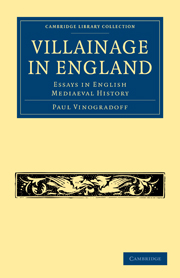Book contents
- Frontmatter
- PREFACE
- Contents
- INTRODUCTION
- FIRST ESSAY: THE PEASANTRY OF THE FEUDAL AGE
- CHAPTER I THE LEGAL ASPECT OF VILLAINAGE. GENERAL CONCEPTIONS
- CHAPTER II RIGHTS AND DISABILITIES OF THE VILLAIN
- CHAPTER III ANCIENT DEMESNE
- CHAPTER IV LEGAL ASPECT OF VILLAINAGE. CONCLUSIONS
- CHAPTER V THE SERVILE PEASANTRY OF MANORIAL RECORDS
- CHAPTER VI FREE PEASANTRY
- CHAPTER VII THE PEASANTRY OF THE FEUDAL AGE. CONCLUSIONS
- SECOND ESSAY: THE MANOR AND THE VILLAGE COMMUNITY
- APPENDIX
- INDEX
CHAPTER II - RIGHTS AND DISABILITIES OF THE VILLAIN
Published online by Cambridge University Press: 16 May 2011
- Frontmatter
- PREFACE
- Contents
- INTRODUCTION
- FIRST ESSAY: THE PEASANTRY OF THE FEUDAL AGE
- CHAPTER I THE LEGAL ASPECT OF VILLAINAGE. GENERAL CONCEPTIONS
- CHAPTER II RIGHTS AND DISABILITIES OF THE VILLAIN
- CHAPTER III ANCIENT DEMESNE
- CHAPTER IV LEGAL ASPECT OF VILLAINAGE. CONCLUSIONS
- CHAPTER V THE SERVILE PEASANTRY OF MANORIAL RECORDS
- CHAPTER VI FREE PEASANTRY
- CHAPTER VII THE PEASANTRY OF THE FEUDAL AGE. CONCLUSIONS
- SECOND ESSAY: THE MANOR AND THE VILLAGE COMMUNITY
- APPENDIX
- INDEX
Summary
Legal theory as we have seen endeavoured to bring the general conception of villainage under the principles of the Roman law of slavery, and important features in the practice of the common law went far to support it in so doing. On the other hand, even the general legal theory discloses the presence of an element quite foreign to the Roman conception. If we proceed from principles to their application in detail, we at once find, that in most cases the broad rules laid down on the subject do not fit all the particular aspects of villainage. These require quite different assumptions for their explanation, and the whole doctrine turns out to be very complex, and to have been put together out of elements which do not work well together.
Villainage by birth
We meet discrepancies and confusion at the very threshold in the treatment of the modes in which the villain status, has its origin. The most common way of becoming a villain was to be born to this estate, and it seems that we ought to find very definite rules as to this case. In truth, the doctrine was changing. Glanville (v. 6) tried in a way to conform to the Roman rule of the child following the condition of the mother, but it could not be made to work in England, and ever since Bracton, both common law and jurisprudence reject it. At the close of the Middle Ages it was held that if born in wedlock the child took after his father, and that a bastard was to be accepted as filius nullius and presumed free.
- Type
- Chapter
- Information
- Villainage in EnglandEssays in English Mediaeval History, pp. 59 - 88Publisher: Cambridge University PressPrint publication year: 2010First published in: 1892

